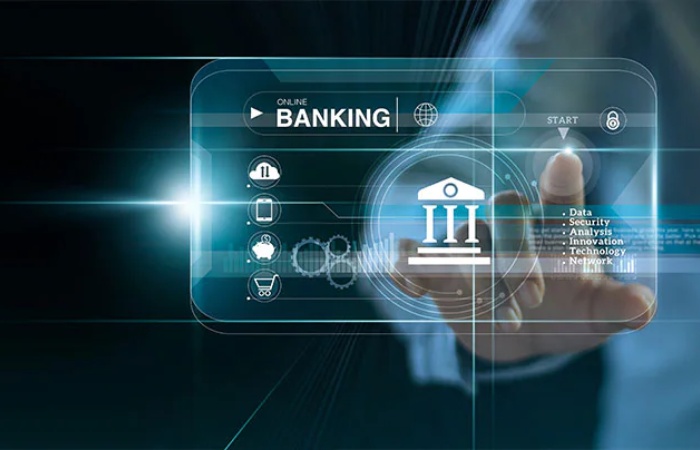The days of standing in line at the bank and filling out paperwork to complete basic transactions are long gone, and today, it is faster and easier than ever for customers and business owners to manage their daily finances with the help of virtual banks. Virtual banking is similar to traditional banking in terms of transactions and services. Still, virtual banking has its unique benefits and challenges and is generally better suited to the needs of your business.
What You Need To Know
- Virtual banking refers to any banking platform that does not have physical branches and
- works exclusively through a browser toolbar and/or mobile app.
- Virtual banking can reduce travel time and transaction costs and help streamline your transactions with mobile deposits, payments, and more.
- The best business banking platforms offer FDIC insurance, competitive fees and interest rates, and a reliable, easy-to-use mobile app.
What Is Virtual Banking?

Today, traditional bank accounts allow you to send money, pay bills, or manage accounts from your browser or mobile app. Virtual banks offer the same digital services but operate online and have no physical branches. For the banking service provider, this reduces the overhead costs of physical branches.
Benefits of Online Banking for Business Owners
Virtual banking has one significant benefit you won’t get from using digital tools at traditional banks: saving money on banking costs. Virtual banking platforms typically charge lower fees than conventional banks, and most don’t have minimum account balances, monthly maintenance, or overdraft fees. Digital banking platforms usually have higher interest rates or annual percentage yield (APY), offering 1.0% to 2.0% more than traditional banks.
Online banking using a virtual bank or the digital tools of a traditional bank also has the following advantages:
- Manage your money from anywhere in the world. Transactions and payments can be made anywhere you do business, anytime.
- Pay bills and track expenses more easily. Digital platforms allow you to use automation tools to stay on top of important financial decisions and payment deadlines.
- Protect your account. In general, online banking is safer than operating with cash. You’ll have more information about each transaction and can pay people without the risk of theft or loss. If your account is compromised, you can block your card(s) remotely and reverse fraudulent transactions.
Standard Features of Virtual Banking Platforms
Most virtual bank accounts have the following standard features:
- Mobile check deposits
- Real-time notifications and automatic payments to help you meet deadlines and improve cash flow management.
- Invoicing and expense management tools, accounting software, or payment acceptance software
- Subaccounts that allow you to divide money for payroll or long-term business goals
How To Choose A Virtual Banking Platform For Your Business
Deposit Insurance
Look for a justification insured by the Federal Deposit Insurance Corporation (FDIC). They offer standard deposit protection up to $250,000, so you won’t lose your cash if the bank fails. Many accounts now provide even more protection through Sweep networks.
Low Fees, High Annual Interest Rate
Look for the best rates and interest rates: High fees can eat into your returns, while a high annual percentage rate (APY) on checking accounts can help your money grow without moving it.
Easy-to-Use App
Look for a business bank account with a mobile banking app that lets you make transactions on the go and is respected by other business owners.
Available Support
Since virtual banking is done entirely online, customer service is critical. Ensure the business checking account you choose has a live chat or phone number where you can contact representatives.
What Do I Need To Open A Virtual Business Bank Account?
Most virtual banking platforms make it easy to open an online account in minutes. While exact requirements vary, you’ll generally need to provide the following:
- Some basic information about yourself and other business owners.
- Identification, such as your driver’s license and/or social security number
- Your tax identification number and/or EIN
- Legal business documentation
- Possibly a minimum deposit to open an account.
The legal documents you will need to provide will depend on the type of business you have:
- Sole proprietors require a business name registration certificate and a business license.
- Partnerships require a partnership contract, a business name record-keeping certificate, a business license, and a state partnership certificate.
- Limited liability companies require articles of incorporation, an LLC operating agreement, and a business license.
- Corporations require bylaws, corporate bylaws, and a business license.
The Future Of Virtual Banking

Virtual banking is a relatively recent addition to business banking, and new trends will continue to change it. Artificial intelligence and mechanism learning are being used to improve recommendation algorithms and chatbots to help show you relevant products and resolve issues quickly.
Open banking is a growing trend that can create even greater efficiencies for business owners. Banks can work with fintech companies to provide financial services through a single platform.
Blockchain technology and cryptocurrencies can make transactions faster, safer, and less expensive.
Virtual banking will become an even bigger part of everyday life for consumers and business owners. Integration with wearable devices and voice banking through smart device assistants like Alexa and Google Home is just around the corner. The banking experience can become immersive thanks to augmented reality (AR). Security measures will always be a priority, especially as virtual banking becomes more common.

